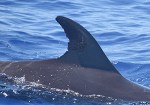DOLPHIN QUEST COLLABORATES WITH WORLD-RENOWNED RESEARCHERS TO STUDY THE SECRETS OF BERMUDA’S DEEPWATER DOLPHINS

Earlier this month, Dolphin Quest Bermuda and the Bermuda Aquarium hosted a team of wildlife biologists, cetologists and veterinarians to learn more about the health, behavior and diving physiology of Bermuda’s deep diving dolphins. Past results from this ongoing study included the deepest recorded dive for a bottlenose dolphin, with a depth over 900 meters!
Building on data collected during Dolphin Quest’s 2003, 2004 and 2005 studies, this year’s focus was on where these dolphins travel, how deep they dive, the metabolic costs of the deep dives and the unique factors that allow them to dive to such great depths. Other areas of interest included genetics, monitoring reproduction, tracking animals over time with individual identification from natural markings and measuring contaminant levels to compare to dolphins that have been studied on the East Coast of the US and the Gulf of Mexico.
Although poor weather conditions prevented the team from placing satellite-linked tags on the animals and performing physical health exams, the scientists were successful in spotting several groups of dolphins that included two mother-calf pairs and two groups of beaked whales. The team was also able to collect dolphin photo ID’s which will provide important insights into the tracking of these animals over time.
The following dolphin images were collected during the project and represent good quality dorsal fin photographs suitable for ID catalog purposes. They show examples of distinctive markings on two different individuals.


Photo Credit: Aaron Barleycorn, Chicago Zoological Society’s Sarasota Dolphin Research Program
“Dolphin Quest’s help in Sarasota Bay, Bermuda, and elsewhere has contributed significantly to establish reference intervals for many health parameters including CBC (complete blood count), serum chemistry, mass: length ratio and stress hormones,” says Dr. Randy Wells from the Chicago Zoological Society’s Sarasota Dolphin Research Program.
The collaborating team of scientists included Andreas Fahlman, PhD from Texas A&M University, Corpus Christi, Dr. Randy Wells, Dr. Katie McHugh, Aaron Barleycorn and Jason Allen from the Chicago Zoological Society’s Sarasota Dolphin Research Program, Dr. Michael Moore from the Woods Hole Oceanographic Institution, Dr. Marina Ivančić from AquaVetRad, Dr. Ian Walker from the Bermuda Zoological Society, Billy Hurley from LeeLan Consulting and Dr. Jay Sweeney and Dr. Rae Stone from Dolphin Quest.
“We believe that the Bermuda dolphin population is isolated from most of the animals in the US, so this serves as a control population,” says Dr. Andreas Fahlman. “We can look at the health of these animals and compare it to the health of the animals in the US. Last year, we had an outbreak of morbillivirus in the US, and this killed up to a thousand dolphins. One of the things we would like to do is see if this virus has spread to this population here in Bermuda.”
Dr. Andreas Fahlman is very interested in the respiratory mechanics of Bermuda’s deep diving dolphins, and the baseline data he was able to voluntarily collect from dolphins at Dolphin Quest provide healthy normal with a direct value to the field research on wild dolphins. Fahlman uses a custom-made pneumotachometer to measure the lung function of the Dolphin Quest dolphins. “This project is a great example of how the scientific, the veterinary and the aquaria and zoo communities work together for the conservation of dolphins in the wild,” says Fahlman.

Dr. Andreas Fahlman from Texas A&M University and Dr. Rae Stone from Dolphin Quest review the results of a voluntary sample from Cirrus, a healthy 42-year-old dolphin at Dolphin Quest.
On Monday, September 14, 2015, researchers from the Bermuda Wild Dolphin Tracking Project spoke to a crowded house at the Bermuda Underwater Exploration Institute. Speakers from the team included Dr. Randy Wells via a pre-recorded segment, Dr. Katie McHugh, Dr. Andreas Fahlman, Dr. Michael Moore via Skype, and Kelly Ann Winfield from Dolphin Quest. This BUEI Talks presentation entitled “Discovering the Secrets of Bermuda’s Deepwater Dolphins” is planned to air on Bermuda’s local CITV channel in the coming days.
